Some years ago an elfin man approached me as I walked along a boulevard in Ho Chi Minh City, Vietnam. He could see I was puzzled and wanted to help. What did I need? Holding out my handfull of trash, I pantomimed dumping it, then shrugged my shoulders and swept my hand in a semicircle to indicate my search for a trash bin. He pointed to the street pavement. No! I shook my head. Yes! he replied with a nod. Springing forward, he grabbed the trash from my hand and threw it on top of a pile at the curb then, flashing a huge grin, turned on his heel and ambled away unconcernedly. Had it not been tossed upon a fetid, stinking garbage heap I would have picked it back up.
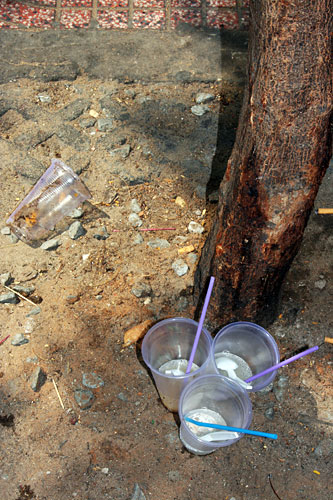
Later that same afternoon I came back to the same neighborhood after a day of traipsing around old Saigon and noticed a woman clad in a green smock and conical straw hat pushing a two-wheeled cart. Every few feet she stopped and bent to the asphalt with her hand broom of twigs to sweep up piles of trash and deposit them in her bin. The pile that had horrified me earlier in the day was long gone, and I suddenly realized that my trash was her job security.
Flash forward to 2010 and my four months of travel around Mexico. A beach bum from way back, I was stunned by the dazzling white sands and crystalline turquoise waters of the Yucatan. The beaches of Tulum and Playa del Carmen are among the most magnificent in the world. As I traveled further south to a largely undeveloped part of the peninsula, mile after mile of exquisite beaches stretched as far as I could see. Unfortunately, so did piles of rubbish. Shampoo bottles, shoes, needles, plastic containers of all kinds had washed up just above the high tide mark; where there were no houses or resorts there were no efforts to clean it up and in places the trash was a foot deep. At the southernmost point of the Yucatan I rolled into Xcalak, a sleepy town best known for its diving and deep sea fishing, and put down roots for a few days.
I brought up the subject of litter with the managers of Casa de Suenos Resort, who insisted that it did not originate in Mexico. Although some claim it comes from cruise ships that dump their trash at sea, current regulations for the cruise ship industry require weighing of the trash when ships return to port. Using available data about the average number of pounds of trash generated per person at sea, a formula is applied according to how many passengers were aboard. If the load is light, the cruise line is subject to severe financial penalties. The more commonly accepted explanation is that currents wash trash up from Central and South America and as evidence that the theory is sound, the resort manager produced a yellow hard hat he had picked up on the beach. Scrawled across the front were the words “Panama Canal.”
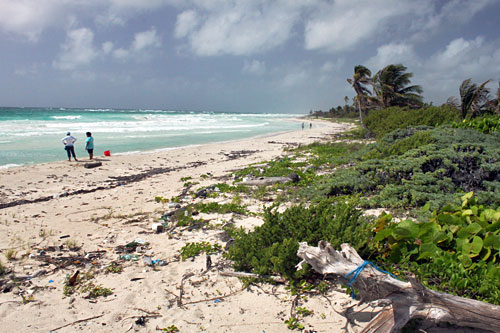
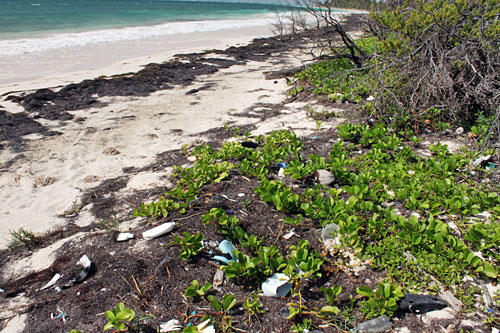
For the past several months I have been back in Asia, where the problem is as severe as anywhere in the world. To a large degree I have learned to look past the garbage; though I still cringe each time someone leans across me to toss their trash out of a bus window, I find myself reasoning that even the plate is made from biodegradable palm leaves. Rather than being appalled, I am simply chagrined when I encounter heaps of trash like the ones around Durbar Square in Kathmandu, Nepal. Last fall, after spending a few days in the cacophonous capital city I made my way to Pokhara where, despite its severely polluted lake and landscape littered with plastic bottles and bags, I fell in love. I planned for three weeks and stayed three months, and it was in Pokhara that I began to understand how the trash problem came about.
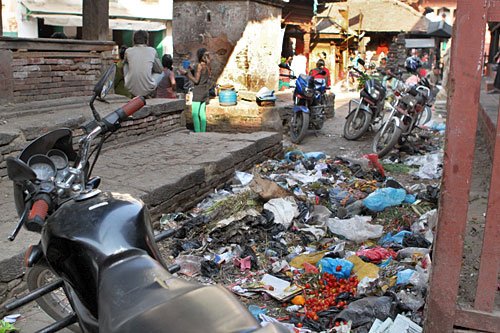
One day last fall I stopped to chat with a group of students who were gathered around a vendor selling oranges. Nepal grows the most delicious oranges in the world, tiny bundles of sweetness so small that four can fit in the palm of my hand. I bought a few, zippered off the smooth skin of one, tossed it into my mouth whole and let the taste of sunshine trickle down my throat. Then I looked for a waste bin which, of course, was nowhere to be found. The kids laughed at me, cavalierly telling me to toss the peels on the ground. No! I may not be as shocked by trash these days but I still refuse to add to the problem.
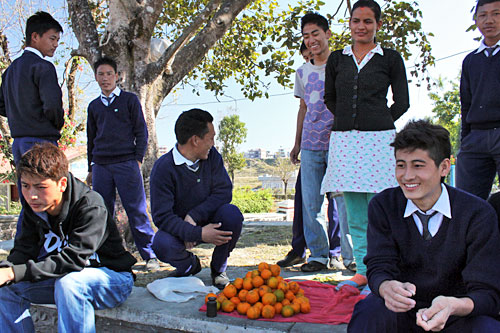
Seeing my distress, the kids tutored. “It goes back into earth. Make orange sweet.” It was like a light bulb going off in my brain. For hundreds of years Nepalis have been recycling organic waste. Even today it is common to see men and women walking with five-gallon buckets, picking up buffalo and cow dung for use on the fields. For centuries their waste was all organic; there were no plastic bottles, inorganic packaging, no batteries or cell phones. Then, in the early 1950’s Nepal opened its borders to foreigners and money from NGO’s and INGO’s flooded into the country. Along with money came the modern world of packaged products and gadgets. Unfortunately, no one thought to educate Nepalis about inorganic waste and as a result, it was thought of and treated no differently than organic trash.
I don’t buy into the argument that eliminating trash on the ground will take away jobs; certainly jobs in the recycling industry could be created to replace those of trash collectors. What I do know is that changing the attitudes of peoples who have thought about trash as a resource for as far back as history has been recorded will take time and education, along with development of industries to manufacture goods from recycled materials. With no end use market, the process is doomed. Yet I do see progress. In Pokhara, one local businessman is now delivering five-gallon bottles of purified water to homes and businesses. Hotels who have opted in to the program are offering guests refills for half the price of buying a new bottle of water, and the larger bottles are picked up, sterilized, and reused. As for organics, I’m not sure I think it should change. I devoured my last orange that afternoon, hesitated for a moment, and then threw my peels into the field next to the road. The kids beamed their approval.

Hello, thank you for your great article. It’s warming to see that it has provoked such reaction. As with many others, this is a topic close to my heart.
I wanted to share my thoughts and experiences:
I returned to Siahanoukville in Cambodia last year after a six year break. It was soul destroying to see how much more rubbish there was than before. The town has developed massively hoping to boost their income from tourism. The tragic thing is that I and many other tourists will never return. It’s not a nice place to holiday.
I was so moved by this that I wrote to the tourism minister and pleaded that they address the problem. I received no reply. Says it all. If the powers that be don’t care, there’s not much hope.
How much does it cost to introduce education about management of litter into the school curriculum? Why can’t they introduce fines which could pay for bins, or community service so the rubbish could be collected up? Could the companies that manufacture the packaging not shoulder some of the burden?
Why aren’t the third world governments doing more? I understand that to an extent this is being done but it needs doing more.
India infuriates me. I love the county for many reasons (I’ve been five times), but I constantly hear the wealthier Indians proudly proclaiming how they are becoming the next super power. Sorry, I think this is rubbish (pardon the pun). A country that can put a rocket into space but not address such basic problems as this has a long way to go. I don’t see much sign of India getting better any time soon.
I too have been to the national park on the Yucatan peninsula. It is so saddening. A David Attinborough documentary stays with me. It’s when he picked up a handful of sand from a tropical island. On closer inspection the sand was tiny fragments of worn down plastics. Plastics that are slowly killing the marine life.
I have thought for some time about setting up a global group/organisation focused on three points: educating the poorer countries, finding volunteers to help clear the worlds rubbish, and to raise money to pay for this massive task.
In fact, I shall start today by at least setting up a Facebook group.
Hi Paul: Couldn’t agree more. I wish you great luck with your Facebook Group idea.
Hello Barbara.my name is husna. i am from KIS international school,Bangkok. i loved your report it was very useful. at the moment in school i am researching about waste. can you tell me your perspective on waste
Hi Barbara. my name is husna. i am from KIS international school Bangkok. i loved your report on waste it is amazing and very helpful. at the moment in school,i am researching about waste. could you tell me about your perspective on waste. i also want to make my school aware of recycling . can you help me?
thank you
Hi Husna: My perspective on waste is that it is unfortunate, but that we cannot make snap judgments about how waste is handled in many countries until we understand the historical context, and then proceed to educate people about why it is bad and how it should be handled. This, of course, has to be dome in cooperation with local governments, which must be willing to create the infrastructure to remove and handle waste, something that is not always possible, especially in extremely poor countries.
thank you so much Barbara! i really appreciate this.
Hi Husna: I’m afraid I wouldn’t be much help regarding the recycling efforts in your particular community. I suggest contacting the appropriate governmental agencies and interviewing those in charge about their recycling efforts.
Great post! This answered some questions for me- mainly why? Why do so many societies in the third world seem comfortable with adding to the abundance of plastic trash in their cities and neighborhoods? That the habit for discarding organic waste has carried over to plastic and non-biodegradable trash makes a good deal of sense.
From my time in Beijing, I saw trash collection was a job for quite a few of the city’s less fortunate. For instance, people would collect discarded plastic bottles for resale at a factory, trash cans were at least available, and rubbish on the street was swept up. Of course, the capitol city of the world’s second largest economy had the funds to do this.
I’m now traveling in Southeast Asia, and it discourages me to see the trash habits and overall accumulation of trash in many of the smaller and poorer cities here. Especially in rural areas, burning trash is how the locals deal with the problem, and much of Myanmar’s air was polluted from what could only be the abundant fires burning plastic trash- the country is simply not developed enough to have air pollution from vehicles or factories.
It’s good to hear that people are making changes, even if they’re small, they have to start somewhere. Thanks again for your post. I’m glad to see another traveler talking about this.
Hi Sally: Glad you found my article thought provoking. I’m currently in Chiang Mai, Thailand, and the skies are gradually getting hazy. Though there is some burning of trash here, the real culprit is the burning of the field to get them ready for the next round of crops. It happens every year, and it gets so smoky in late February and March that you can’t see the tops of most of the buildings just a few blocks away. I suspect that’s what you’re seeing in Myanmar as well.
Much has been said and discussed the crimes committed from the aborigines contrary to the white man, however it should be remembered that the blacks received great provocation. His fee was 110 guineas, knowing that of the hotel keeper was 30 guineas.
I pay a quick visit each day a few web sites and sites to read
content, but this blog offers feature based articles.
I lived in HCMC for 16 months and the trash was unbelievable, however it did result in the biggest rats I have ever seen in my life, so at least something appreciated it. But what else are they going to do with it apart from put it on the street? There is no big truck that comes and picks it up for you and people don’t understand the negative affect it has on the drains and water ways.
Ironically, it was illegal to dump trash on the street of the post tourist district.
Hi Liz: The trash in SE Asia impacted me at first, but then somewhere along the way I just stopped seeing it.I really think that’s when I got under the surface and began to really understand Asia. But, having said that, I do think it is beginning to improve.
Recycling/composting is definitely just a matter of education, but I think our increasing use of petroleum-based plastics is a much bigger problem. It has been great to city certain cities/countries banning plastic bags, but we need to find a cheap, biodegradable alternative to plastic containers for laundry detergent, soda, etc. Imagine if they could make something that Nepalese could throw into the field right alongside those orange peels and turn into organic waste! I believe it’s coming, and whoever invents will become VERY wealthy indeed.
VERY interesting idea Green Global!
I had just been thinking about posting about this. We just returned from a short stay in Mexico. I will link to this post.
b
We need to take any immediate action to ban the plastic.
I haven’t read any articles or blogs about this problem until now. Insightful comments. It makes me wonder about health issues that are linked to brain development and how our greatest resource (our minds) are being effected.
Liter bothers me quite a bit; such a big problem on so many levels but an act that would be simple to prevent (in theory). However with small organics I’m not as bothered, especially if they’re thrown out of way and can biodegrade nicely back into the ground.
The great and interesting article you have contribute here. You have aware oft he trash mentality of the people and I like this for great story,
When my American wife moved to India to be with me, I had to teach her the Indian way of dealing with trash. We usually throw things as we go. I used to throw cigar-et butts out of the car as we drive and I had to hear big lecture from her. She always says that India is not going to reach anywhere near US or Europian countries unless we lean how to deal with these little trash management.
We have been in Antigua, Guatemala for the past week taking in the epic Semana Santa celebrations here. Thousands and thousands of people, dozens of processions through the streets and hundreds and hundreds of elaborate (mostly) organic decorations on the streets in front of people’s houses. It could have all added up to one unholy mess but it didn’t. People used public trash cans and a clean up crew with brooms, a front-end loader and a dump truck (sponsored by Pepsi) followed each procession and removed the remains of the street art (called alfombras) seconds after anything valuable (untrampled fresh flowers or fresh vegetables) was collected by locals.
That said, there is a terrible toss-it mentality in Guatemala. We were recently riding in a mini-van with a young boy (about 12) in the Peten region and when he made a move to toss a small styrofoam plate out the van window I stopped him and tried to explain that if tosses a plate and everyone else tosses a plate pretty soon the road is ugly and the villages are sick and no tourists come and his dad (a local guide) is out of work. he looked at me blankly so we took his plate and carried it around for the next hour until we found a garbage can. We like to think he paused for a second before tossing his next plate.
Part of it is a true lack of track cans. A bigger part, as you point out, is a sudden surge in non-organic trash. It’s one thing to toss an apple core. Quite another to toss a styrofoam plate. A horrifying example of what can happen when the trash changes but the habits don’t was taking place in India in the late ’90s when many of the roving train station chai sellers made the switch from completely natural terracotta cups to white plastic cups which were lighter and, incredibly, cheaper.
Most of the billions of people who ride Indian trains gets a chai and every one of them chucks the cup out the window when they’re done. The terracotta cups simply shattered and dissolved into the earth. You can imagine what a billion white plastic cups do.
Hi Trans Americas: Yes, I don’t know why I never saw the problem clearly
before.I’ve certainly been traveling in third-world countries for years but
never put two and two together with regard to the cause and effect from
inorganic waste. The solution is partly education and partly government
infrastructure (more trash cans, as you point put, and then the garbage
trucks to empty them and processes to handle the waste).
But even if recycling programs are put in place, there’s another big factor
that no one is talking about. There has to be an after-market for recycled
goods. This was a problem in the early years of the recycling efforts in the
U.S. We collected recyclables and separated them, but no products had yet
been developed that could use the recycled goods as raw materials.
Fortunately, American ingenuity prevailed and now recycled materials are now
being used to make greeting cards, park benches, plastic fencing and many
more products. Ground recycled glass and rubber tires are now being added to
asphalt. The list goes on. Third world countries will need assistance to
develop this “after-product” market and build factories to produce the
products before any recycling program can be truly effective.
You should strictly follow to avoid plastics in our day-to-day life. Then only we can see the full green in our earth.